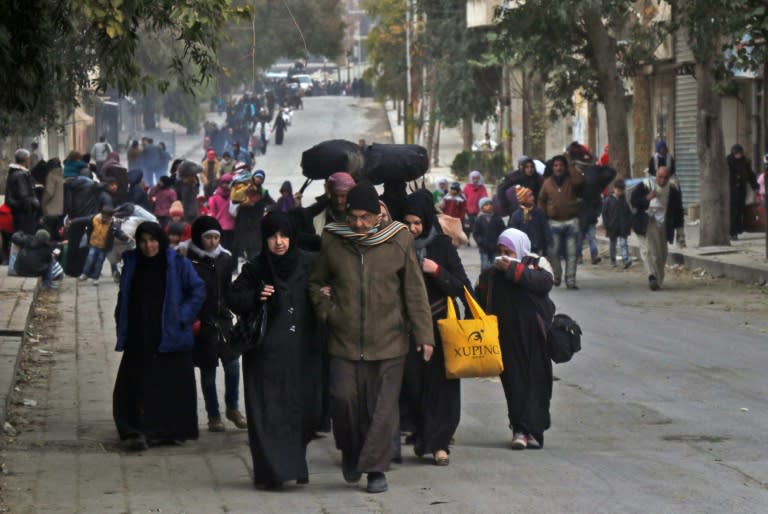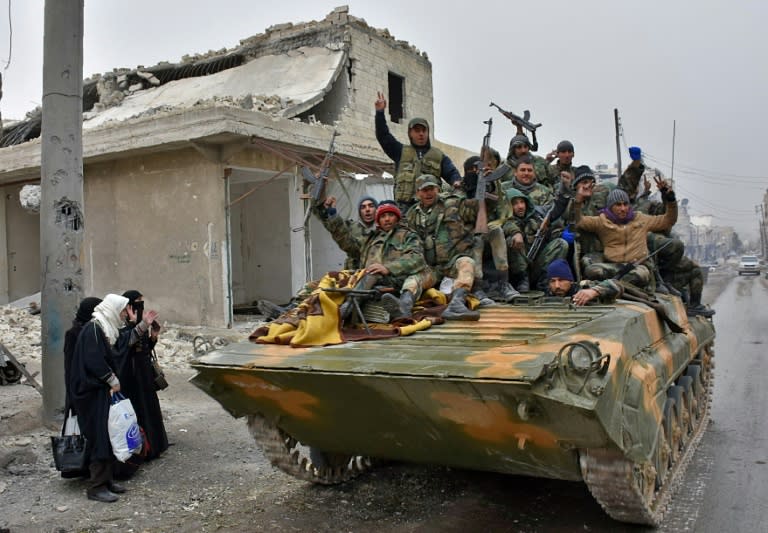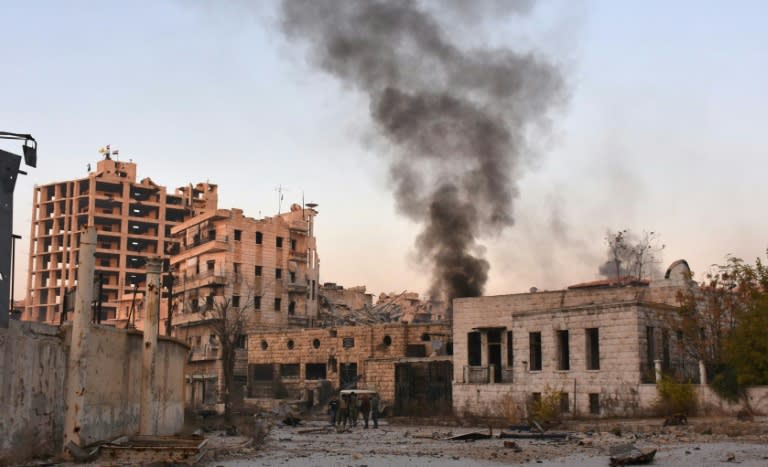Half of rebel Aleppo falls to Syrian forces
Syrian government forces have recaptured half the former rebel stronghold of east Aleppo, a monitor said, with the UN now facing a "race against time" to aid children forced out by the bloody offensive. President Bashar al-Assad's forces have made swift gains since their offensive against Aleppo -- once Syria's commercial powerhouse -- began on November 15. Tens of thousands of civilians have streamed out of the city's east, and Russia has renewed calls for humanitarian corridors so aid can enter and desperate residents can leave. Regime forces Friday "consolidated their control" over two eastern districts and were pushing further to squeeze the shrinking rebel enclave, said Syrian Observatory for Human Rights head Rami Abdel Rahman. "After the recent advances, the regime is comfortably in control of half of former rebel territory in the city's east," he said Friday. Dozens of families trickled out Friday, adding to the more than 50,000 people who have poured from east Aleppo into territory controlled by government forces or local Kurdish authorities, the Observatory said. Among those fleeing are nearly 20,000 children, according to estimates by the UN's children's agency. "What is critical now is that we provide the immediate and sustained assistance that these children and their families desperately need," UNICEF spokesman Christophe Boulierac said. "It's a race against time, as winter is here and conditions are basic." - 'A giant graveyard' - The loss of east Aleppo -- a rebel stronghold since 2012 -- would be the biggest blow to Syria's opposition in more than five years. Earlier Friday, anti-government fighters had successfully rolled back regime gains in Sheikh Saeed on Aleppo's southeastern outskirts. Sheikh Saeed borders the last remaining parts of Aleppo still in rebel hands -- a collection of densely populated residential neighbourhoods where thousands have sought refuge from advancing regime forces. In preparation for street-by-street fighting in these districts, hundreds of fighters from Syria's elite Republican Guard and Fourth Division arrived in Aleppo Friday, the Britain-based Observatory said. It said four civilians were killed in rebel rocket fire on government-held areas, bringing to 59 the civilian toll in the city's west. More than 300 civilians, including dozens of children, have been killed in east Aleppo since the offensive began, according to the Observatory. Intermittent clashes rocked residential buildings on Aleppo's eastern edges Friday, as regime forces sought to secure the road towards the airport. AFP's correspondent in east Aleppo said ferocious clashes could be heard in the Tariq al-Bab district, where regime forces advanced Thursday. Civilians had already totally emptied the adjacent neighbourhood of Al-Shaar, where a few rebels manned positions in front of shuttered shops and bakeries. Vegetable stalls -- empty for months because of a devastating government siege -- now lay shattered by heavy artillery fire. The escalating violence has been met with international outrage, including a UN warning that east Aleppo could become "a giant graveyard". - Wary of Russian offers - Moscow has proposed setting up four humanitarian corridors into east Aleppo. "We have informed the UN in New York and Geneva that there is no longer a problem with the delivery of humanitarian cargo to eastern Aleppo," Russia's Foreign Minister Sergei Lavrov said. He said the UN was coming up with a plan and approval from Syrian authorities remained essential. Moscow has announced several humanitarian pauses in Aleppo to allow civilians to flee, but until the recent escalation, only a handful did so. East Aleppo residents have been wary of previous such offers because of Russia's support for Assad, including a bombing campaign backing his forces since September 2015. US Secretary of State John Kerry late Friday said he had spoken to Lavrov about the situation in Aleppo. "We are deeply concerned about the humanitarian disaster that continues to unfold in Aleppo," he said. "It is absolutely vital that the killings be replaced by immediate moves of humanitarian goods." The conflict erupted in March 2011 with protests calling for Assad's ouster, and has since evolved into a highly globalised war that has killed more than 300,000 people. Also Friday, around 2,000 people including rebels and their families quit an opposition-held town north of Damascus under a deal with the government. The evacuation of Al-Tal was the sixth such operation in three months.





